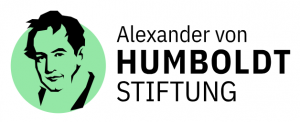Philipp Schwartz Initiative of the Alexander von Humboldt Foundation for Threatened Researchers
The Philipp Schwartz Initiative provides universities and research institutions in Germany with the means to host threatened foreign researchers for a period of 24 months on a fully funded research fellowship. An extension is possible under a co-financing model.
The Initiative is funded by the Federal Foreign Office, with generous additional support from the Alfried Krupp von Bohlen and Halbach Foundation, the Andrew W. Mellon Foundation, the Fritz Thyssen Foundation, the Gerda Henkel Foundation, the Klaus Tschira Foundation, the Robert Bosch Foundation, the Stifterverband, and the Stiftung Mercator.
"Philipp Schwartz Initiative" is a globally registered trademark.
Applications in the 5th call of the Philipp Schwartz Initiative can be submitted until 8 March 2019. Applications forms are available on our website. The results of the selection process will be published at the beginning of June 2019.
Who can apply?
Research-performing institutions in Germany in the following categories may apply:
- public and state-recognised universities, including universities of applied sciences ("Fachhochschulen")
- Max Planck Institutes, Helmholtz Institutes, Leibniz Institutes, Fraunhofer Institutes
- Federal and State Research Institutes
- other research-performing institutions that can convincingly demonstrate their research focus and infrastructures
Successful applicants will be able to grant a Philipp Schwartz Fellowship to a threatened researcher. In detail:
- institutions that were successful in previous calls for applications (no submission of support concepts in the current call; only nomination of researcher)
- institutions that applied but were not successful in previous calls for applications
- institutions that have not applied for Philipp Schwartz funding before
Please note that researchers cannot apply on an individual basis. We recommend that researchers interested in this programme contact potential host institutions in Germany, which may be in a position to submit an application.
Who is eligible for a Philipp Schwartz fellowship?
Threatened researchers from any academic field and any country of origin who
- have completed their doctorate or a comparable academic degree (PhD, CSc or equivalent)
- do not reside or have not been resident outside their own country for more than three years; researchers who hold German university entrance qualifications (“Bildungsinländer”) are not eligible
- possess the language skills required to successfully conduct their research projects
- possess academic qualifications (e.g. publications)
- possess potential to be integrated into the (research-related) job market
- who have not yet been funded in the context of the Philipp Schwartz Initiative
- persons that have access to residence in safe countries due to multiple citizenship and German citizens are not eligible for nomination
- multiple nominations of one person by several institutions are not permitted
The Humboldt Foundation imposes no restrictions with regard to country of origin or current location if the threat can be confirmed in accordance with the programme guidelines.
If an institution is interested in hosting a threatened researcher, but not aware of a specific person, they are invited to contact the Scholars at Risk Network (SAR) and the Council for At-Risk Academics (CARA). Both organisations are experienced in placing threatened researchers and are able to make suggestions accordingly.
What does the funding include?
Host institutions will receive funding from the Humboldt Foundation and act as fellowship-granting agencies, awarding a Philipp Schwartz fellowship to the threatened researcher. The funding consists of two components:
- fellowship funds including subsidies of 3,500 EUR/month for up to 24 months (an extension of up to 12 months on the context of a co-financing model may be granted upon application in the course of the initial funding period)
- auxiliary funds for the host institution of 20,000 EUR per each fellow hosted
What are the elements of an application?
- concept for a sustainable support infrastructure for threatened researchers (this does not apply to institutions successful in a previous call for applications)
- application for a Philipp Schwartz fellowship including confirmation that the researcher is threatened
- financing plan
How can a threat to a researcher be confirmed in the context of the Philipp Schwartz Initiative?
In the context of the Philipp Schwartz Initiative, a pertinent threat can be confirmed in two ways:
- by way of a residence status in the context of an asylum-granting procedure within the EU that confirms a recognised threat
- by way of a credible threat assessment issued no more than 12 months ago by a third party, such as the Scholars at Risk Network (SAR) or the Council for At-Risk Academics (CARA)
Candidates with a residence status in the EU resulting from an asylum-granting procedure that confirms a recognised threat do not need to contact our partners for a threat assessment. Please note that CARA can only accept such requests from universities and other institutions, while SAR will accept requests for threat assessments both from institutions and from individual at-risk researchers. Please do not approach more than one partner organisation for an assessment.
In order to ensure that assessments can be completed in time, all relevant documentation must be submitted to our partners SAR or CARA by 15th February 2019.
